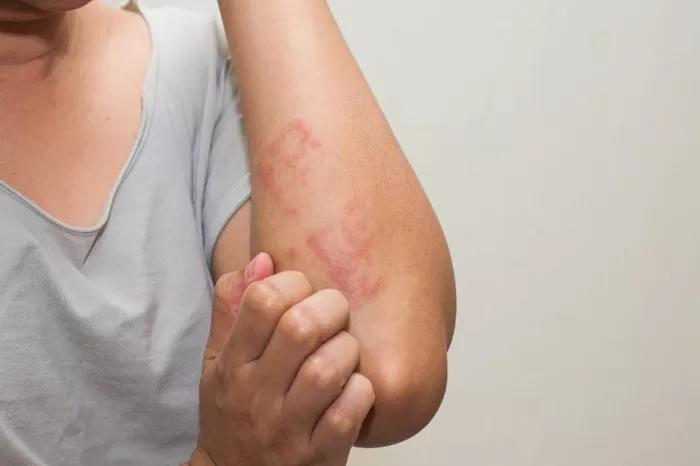Skin allergic reactions can range from mild irritation to severe inflammation, causing discomfort and distress for those affected. Understanding how long these reactions typically last can help individuals manage their symptoms and know when to seek medical attention. In this comprehensive article, we’ll explore the duration of skin allergic reactions, factors that influence their longevity, and strategies for relief and treatment.
The Spectrum of Skin Allergic Reactions
Skin allergic reactions can manifest in various forms, depending on the allergen involved, the individual’s immune response, and other factors. Common types of skin allergic reactions include:
Contact Dermatitis: Contact dermatitis is a localized skin reaction that occurs when the skin comes into direct contact with an allergen or irritant. Symptoms may include redness, itching, swelling, and the development of small bumps or blisters. Contact dermatitis can be caused by substances such as metals (e.g., nickel), cosmetics, fragrances, latex, and certain plants (e.g., poison ivy).
Atopic Dermatitis (Eczema): Atopic dermatitis, commonly known as eczema, is a chronic inflammatory skin condition characterized by dry, itchy, and inflamed patches of skin. Eczema can be triggered by a variety of factors, including allergens, irritants, genetics, and environmental factors. Symptoms may come and go over time, with flare-ups occurring in response to triggers such as stress, weather changes, or exposure to certain substances.
Urticaria (Hives): Urticaria, or hives, is a skin rash characterized by raised, red, and itchy welts or bumps that can appear suddenly and resolve within hours or days. Hives can be triggered by allergens, such as foods, medications, insect bites, or environmental factors. In some cases, hives may be accompanied by swelling of the lips, tongue, or face, a condition known as angioedema.
Allergic Contact Dermatitis: Allergic contact dermatitis occurs when the skin develops an allergic reaction to a specific substance upon repeated exposure. Common allergens that can trigger allergic contact dermatitis include metals (e.g., nickel), fragrances, preservatives, and certain medications. Symptoms typically include redness, itching, swelling, and the development of a rash at the site of contact.
Factors Influencing the Duration of Skin Allergic Reactions
The duration of a skin allergic reaction can vary depending on several factors, including:
Type of Allergen: The type of allergen involved can influence the duration and severity of the allergic reaction. Some allergens may trigger immediate and intense reactions, while others may cause delayed or prolonged symptoms.
Individual Sensitivity: Individuals vary in their sensitivity to allergens and their immune response. Factors such as genetics, underlying health conditions, and previous exposure to the allergen can impact the severity and duration of allergic reactions.
Extent of Exposure: The duration and intensity of exposure to the allergen can affect the severity and duration of the allergic reaction. Brief or minimal exposure may result in milder symptoms that resolve more quickly, while prolonged or repeated exposure may lead to more persistent symptoms.
Treatment and Management: Prompt treatment and management of skin allergic reactions can help alleviate symptoms and shorten the duration of the reaction. Over-the-counter and prescription medications, topical treatments, and lifestyle modifications can all play a role in managing allergic reactions and promoting healing.
Duration of Common Skin Allergic Reactions
While the duration of a skin allergic reaction can vary depending on the factors mentioned above, here’s a general overview of how long common skin allergic reactions may last:
Contact Dermatitis: Contact dermatitis typically lasts for one to two weeks, although symptoms may persist longer if the allergen or irritant is not removed or if the skin is repeatedly exposed to the triggering substance.
Atopic Dermatitis (Eczema): Eczema is a chronic condition with periods of flare-ups and remission. Acute flare-ups of eczema may last for several days to weeks, with symptoms improving over time with appropriate treatment and management.
Urticaria (Hives): Hives can appear suddenly and resolve within hours or days, although in some cases, they may persist for several weeks or months. Chronic hives, defined as hives lasting for six weeks or longer, may require further evaluation and treatment by a healthcare professional.
Allergic Contact Dermatitis: Allergic contact dermatitis may last for one to two weeks, depending on the severity of the reaction and the extent of exposure to the allergen. Avoiding further contact with the allergen is crucial for resolving symptoms and preventing recurrence.
Strategies for Relief and Treatment
While the duration of a skin allergic reaction can vary, there are several strategies for relieving symptoms and promoting healing:
Avoidance: Identify and avoid triggers or allergens that may cause allergic reactions, such as certain foods, medications, cosmetics, or environmental factors.
Topical Treatments: Use topical treatments such as corticosteroid creams or ointments, antihistamine creams, or soothing emollients to alleviate itching, inflammation, and redness associated with allergic reactions.
Oral Medications: Over-the-counter or prescription oral medications, such as antihistamines or corticosteroids, may be recommended to relieve itching, swelling, and other symptoms of allergic reactions.
Cool Compresses: Apply cool compresses or wet wraps to affected areas to soothe itching, reduce inflammation, and promote healing of the skin.
Moisturization: Keep the skin well-hydrated with regular use of moisturizers or emollients to prevent dryness and irritation, particularly in individuals with eczema or dry skin conditions.
Medical Evaluation: Seek medical evaluation and treatment if symptoms of a skin allergic reaction are severe, persistent, or affecting daily functioning. A healthcare professional can provide a proper diagnosis, recommend appropriate treatment, and offer guidance on managing allergic reactions effectively.
Conclusion: Navigating Skin Allergic Reactions with Knowledge and Care
Skin allergic reactions can range from mild irritation to severe inflammation, causing discomfort and distress for those affected. While the duration of a skin allergic reaction can vary depending on factors such as the type of allergen, individual sensitivity, and extent of exposure, there are strategies for relief and treatment available.
By understanding the factors that influence the duration of skin allergic reactions and knowing how to effectively manage symptoms, individuals can navigate their allergic reactions with knowledge, care, and confidence. If you or someone you know experiences symptoms of a skin allergic reaction, it’s important to seek medical evaluation and treatment to ensure proper diagnosis and management of the condition. With appropriate treatment and management strategies, individuals can find relief from allergic symptoms and promote healing of the skin.
[inline_related_posts title=”You Might Be Interested In” title_align=”left” style=”list” number=”6″ align=”none” ids=”7108,7105,7102″ by=”categories” orderby=”rand” order=”DESC” hide_thumb=”no” thumb_right=”no” views=”no” date=”yes” grid_columns=”2″ post_type=”” tax=””]
































